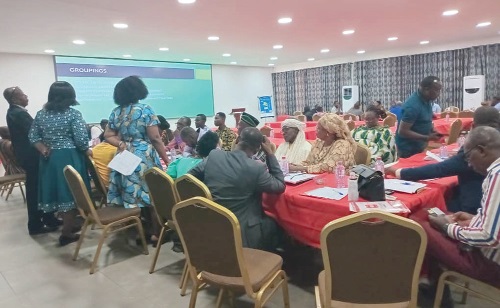The Cape Coast Metropolitan Assembly (CCMA) has held a consultative session in collaboration with key stakeholders towards the development of an eight-year development plan to guide the accelerated development of the metropolis.
The plan will aim at strategically transforming the Cape Coast Metropolis significantly across all major sectors.
The session brought together a wide range of participants, including traditional leaders, religious groups, school heads, academia, civil society actors, drivers and political figures, to share ideas and propose strategic interventions for the future development of the city.
The meeting was held in a non-partisan atmosphere, with stakeholders emphasising that the plan should reflect the collective interests of the people rather than any political agenda.
Participants were grouped under five thematic areas: economic development, social development, environmental and sanitation management, infrastructure and service delivery, and governance and administration, to discuss practical ideas based on the challenges and opportunities within the metropolis.
Key proposals
For economic development, stakeholders proposed the establishment of a tourist information office to guide visitors before they reach their destinations.
They noted that this would help bring order to tourist activities and generate revenue for the community while also ensuring that all tourism-related services were standardised.
They also suggested promoting pilgrimage tourism, as a way of attracting investment in hotels and lodges.
They explained that such an initiative could extend benefits to surrounding municipalities and districts and contribute generally to national development.
Additionally, a new women-focused festival was proposed to boost both cultural expression and economic activities.
In the agricultural sector, participants recommended the deployment of technical staff and the establishment of an independent investment committee to mobilise funding from both local and external sources to support agricultural development.
Social development
Participants in the social group called for the completion of abandoned school projects and the renovation of community libraries.
They also proposed upgrading school infirmaries into CHPS compounds to improve healthcare delivery.
Stakeholders stressed the need to publicly acknowledge individuals and institutions that contribute to educational development, especially during community festivals.
The stakeholder group on environmental and sanitation management also recommended collaboration with the community, for household refuse dumps and the introduction of door-to-door waste collection.
They emphasised community education on sanitation and proposed the redevelopment of the Fosu Lagoon to support both environmental health and disaster management.
Infrastructure
The infrastructure and service delivery group also proposed the expansion of road networks and electricity supply to underserved communities and stressed the need for structural planning to prevent slum development.
The group also suggested measures to reduce flooding, further develop the Fosu Lagoon Park, and install streetlights.
They called for the installation of solar-powered streetlights in some areas to prevent cable theft, and cable-powered streetlights in more secure zones.
Stakeholders also proposed the formation of a committee to oversee the yearly implementation of the development plan.
They stressed prioritising key projects based on available funding and making efficient use of the District Assemblies Common Fund.
They also raised the need to instill discipline in the community, starting with those involved in development planning, for better-planned communities.
They also called for support from both government and private sources to ensure the successful implementation of the plan.
Support, commitments
The Metropolitan Chief Executive (MCE) for Cape Coast, George Justice Arthur, expressed appreciation for the strong support from all sectors and noted that the process would be continued through community engagements to gather more input from residents.
He commended both Members of Parliament for Cape Coast North and South, Dr Kwamena Minta Nyarku and Kwaku Ricketts-Hagan, for their support.
He said while Mr Ricketts-Hagan sponsored the stakeholder consultations, Dr Nyarku had pledged to support the upcoming community-level engagements.
The Omanhen of the Oguaa Traditional Area, Osabarimba Kwesi Atta II, cautioned against the continuous abandonment of projects by successive governments.
He urged planners to ensure continuity and discipline in the execution of projects, stressing that Cape Coast deserved long-term development that transcended political cycles.
The MP for Cape Coast North, Dr Kwamena Nyarku, shared concerns about the gap between the city's identity and its realities.
“We call Cape Coast the city of tourism and education, yet that is not reflected in the condition of our schools or infrastructure,” he said.
He encouraged all to be united and committed to the development of the area, adding that the outcome of the plan should make Cape Coast a model city in practice, not just in name.

